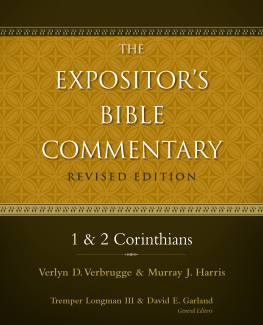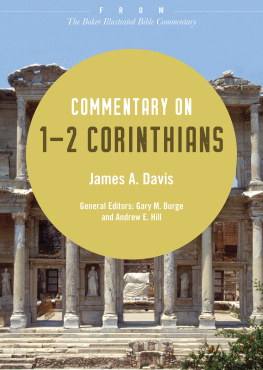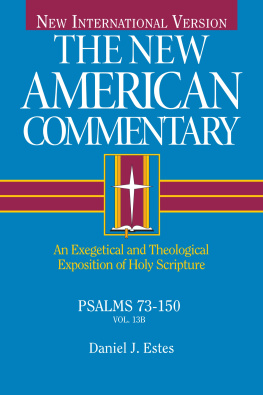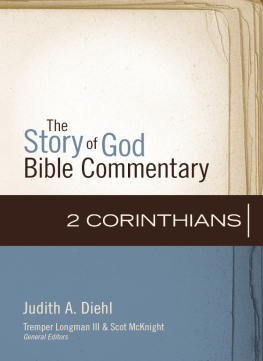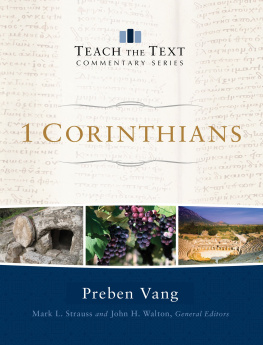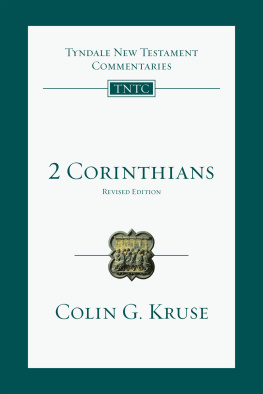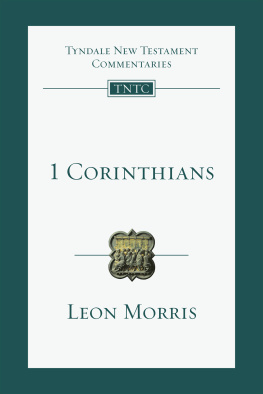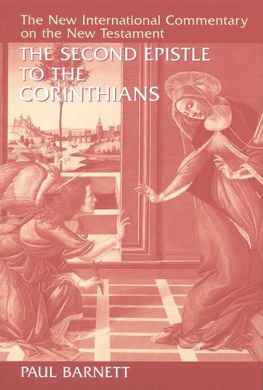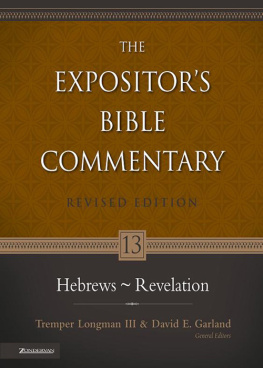
Volume
28
1 CORINTHIANS
MARK TAYLOR

Nashville, Tennessee
Table of Contents
Guide
General Editor
E. RAY CLENDENEN
Associate General Editor, OT
KENNETH A. MATHEWS | Associate General Editor, NT
DAVID S. DOCKERY |
Consulting Editors
Old Testament
DUANE A. GARRETT
EUGENE H. MERRILL
LARRY L. WALKER | New Testament
RICHARD R. MELICK JR.
PAIGE PATTERSON
B. PAUL WOLFE |
Copyright 2014 B&H Publishing Group
All rights reserved.
ISBN 978-0-8054-0128-8
Dewey Decimal Classification: 227.2
Subject Heading: BIBLE. N.T.Commentaries\BIBLE. N.T. 1 Corinthians\BIBLESTUDY AND TEACHING
Printed in the United States of America
18 17 16 15 14 8 7 6 5 4 3 2 1
LB
Unless otherwise stated all Scripture citations are from the Holy Bible, New International Version. Copyright 1973, 1978, 1984 by International Bible Society. Used by permission of Zondervan Publishing House. All rights reserved.
Scripture quotations identified as CEV are taken from the Contemporary English Version Copyright 1991, 1992, 1995 American Bible Society. Used by permission.
Scripture quotations marked ESV are taken from The Holy Bible, English Standard Version) copyright 2001 by Crossway, a publishing ministry of Good News Publishers. ESV Text Edition: 2011. The ESV text has been reproduced in cooperation with and by permission of Good News Publishers. Unauthorized reproduction of this publication is prohibited. All rights reserved.
Scripture quotations marked HCSB have been taken from the Holman Christian Standard Bible Copyright 1999, 2000, 2002, 2003 by Holman Bible Publishers. Used by permission.
Scripture quotations marked JPSV are from TANAKH: A New Translation of THE HOLY SCRIPTURES According to the Traditional Hebrew Text. Copyright The Jewish Publication Society, 1985. Used by permission.
Scripture citations marked NASB are from the New American Standard Bible. The Lockman Foundation, 1960, 1962, 1968, 1971, 1973, 1975, 1977. Used by permission.
Scripture citations marked NEB are from the New English Bible. Copyright The Delegates of the Oxford University Press and the Syndics of the Cambridge University Press, 1961, 1970. Reprinted by permission.
Scripture quotations marked NET are taken from the New English Translation of the Bible copyright 1996-2006 by Biblical Studies Press, L.L.C. http://netbible.com All rights reserved. Scripture quotations marked NIV2011 are taken from the Holy Bible, New International Version, NIV. Copyright 1973, 1978, 1984, 2011 by Biblica, Inc. Used by permission. All rights reserved.
Scripture quotations marked NJB are from The New Jerusalem Bible. Copyright 1990 by Darton, Longman & Todd, Ltd. and Doubleday, a division of Bantam Doubleday Dell Publishing Group. Used by permission.
Scripture citations marked NKJV are from the New King James Version, copyright 1979, 1980, 1982, Thomas Nelson, Inc., Publishers.
Scripture citations marked NLT are from the Holy Bible, New Living Translation, copyright 1996. Used by permission of Tyndale House Publishers, Inc., Wheaton, Illinois 60189. All rights reserved.
Scripture citations marked NRSV are from the New Revised Standard Version of the Bible, copyright 1989 by the Division of Christian Education of the National Council of Churches of Christ in the United States of America. Used by permission. All rights reserved.
Scripture citations marked REB are from the Revised English Bible. Copyright 1989 by Oxford University Press and Cambridge University Press. Reprinted by permission.
Scripture citations marked RSV are from the Revised Standard Version of the Bible, copyrighted 1946, 1952, 1971, 1973 by the National Council of the Churches of Christ in the U.S.A. and used by permission.
Scripture citations marked TEV are from Todays English Version, Second Edition Copyright 1966, 1971, 1976, 1992 American Bible Society. Used by permission.
To
my wife, Ann,
and my daughters,
Mary, Audrey, and Anna Ruth,
for their love and support
Editors Preface
Gods Word does not change. Gods world, however, changes in every generation. These changes, in addition to new findings by scholars and a new variety of challenges to the gospel message, call for the church in each generation to interpret and apply Gods Word for Gods people. Thus, THE NEW AMERICAN COMMENTARY is introduced to bridge the twentieth and twenty-first centuries. This new series has been designed primarily to enable pastors, teachers, and students to read the Bible with clarity and proclaim it with power.
In one sense THE NEW AMERICAN COMMENTARY is not new, for it represents the continuation of a heritage rich in biblical and theological exposition. The title of this forty-volume set points to the continuity of this series with an important commentary project published at the end of the nineteenth century called AN AMERICAN COMMENTARY, edited by Alvah Hovey. The older series included, among other significant contributions, the outstanding volume on Matthew by John A. Broadus, from whom the publisher of the new series, Broadman and Holman, partly derives its name. The former series was authored and edited by scholars committed to the infallibility of Scripture, making it a solid foundation for the present project. In line with this heritage, all NAC authors affirm the divine inspiration, inerrancy, complete truthfulness, and full authority of the Bible. The perspective of the NAC is unapologetically confessional and rooted in the evangelical tradition.
Since a commentary is a fundamental tool for the expositor or teacher who seeks to interpret and apply Scripture in the church or classroom, the NAC focuses on communicating the theological structure and content of each biblical book. The writers seek to illuminate both the historical meaning and contemporary significance of Holy Scripture.
In its attempt to make a unique contribution to the Christian community, the NAC focuses on two concerns. First, the commentary emphasizes how each section of a book fits together so that the reader becomes aware of the theological unity of each book and of Scripture as a whole. The writers, however, remain aware of the Bibles inherently rich variety. Second, the NAC is produced with the conviction that the Bible primarily belongs to the church. We believe that scholarship and the academy provide an indispensable foundation for biblical understanding and the service of Christ, but the editors and authors of this series have attempted to communicate the findings of their research in a manner that will build up the whole body of Christ. Thus, the commentary concentrates on theological exegesis while providing practical, applicable exposition.
THE NEW AMERICAN COMMENTARYs theological focus enables the reader to see the parts as well as the whole of Scripture. The biblical books vary in content, context, literary type, and style. In addition to this rich variety, the editors and authors recognize that the doctrinal emphasis and use of the biblical books differs in various places, contexts, and cultures among Gods people. These factors, as well as other concerns, have led the editors to give freedom to the writers to wrestle with the issues raised by the scholarly community surrounding each book and to determine the appropriate shape and length of the introductory materials. Moreover, each writer has developed the structure of the commentary in a way best suited for expounding the basic structure and the meaning of the biblical books for our day. Generally, discussions relating to contemporary scholarship and technical points of grammar and syntax appear in the footnotes and not in the text of the commentary. This format allows pastors and interested laypersons, scholars and teachers, and serious college and seminary students to profit from the commentary at various levels. This approach has been employed because we believe that all Christians have the privilege and responsibility to read and seek to understand the Bible for themselves.




